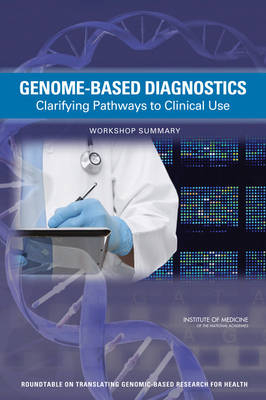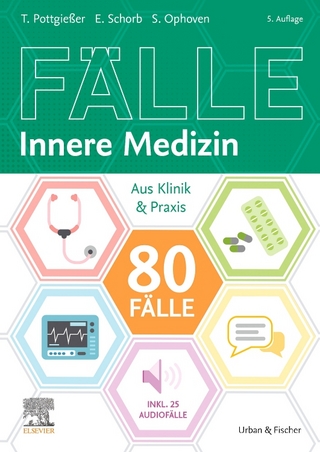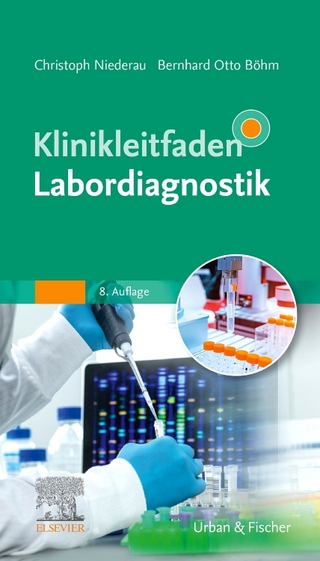
Genome-Based Diagnostics
Clarifying Pathways to Clinical Use: Workshop Summary
Seiten
2012
National Academies Press (Verlag)
978-0-309-25394-9 (ISBN)
National Academies Press (Verlag)
978-0-309-25394-9 (ISBN)
The sequencing of the human genome and the identification of associations between specific genetic variants and diseases have led to an explosion of genomic-based diagnostic tests. These tests have the potential to direct therapeutic interventions, predict risk or onset of disease, or detect residual disease. As research progresses and an increasing number of associations are found, further tests will be developed that can aid in providing personalized treatment options for patients. However, the adoption of genomic diagnostic tests by health care providers has been limited due to a lack of evidence regarding the clinical utility of many tests. Health funders and practitioners lack the data necessary to distinguish which tests can improve practice or the clinical settings in which tests will provide the greatest value. The Roundtable on Translating Genomic-Based Research for Health held a workshop in November 2010 to determine what evidence is needed and how it is viewed by different stakeholders in order to develop genomic diagnostic tests of clinical value.
Genome-Based Diagnostics summarizes the presentations and discussions that took place throughout the workshop. Two presentations, in particular, sparked extensive discussion. One presentation proposed that all genomic diagnostic tests be reviewed and approved by the Food and Drug Administration. The other observed that venture capitalists are no longer investing substantially in the development of genomic diagnostic tests because of a lack of clarity surrounding regulatory and reimbursement pathways. Both presentations suggested the need for major changes in the systems used to develop, regulate, and reimburse genomic diagnostic tests. The report also presents the perspectives of different stakeholders in the development of genomic diagnostic tests. Each stakeholder group has a different set of needs and issues of importance, yet commonalities among them are apparent, such as the need to put patients and health outcomes at the center of discussion and action.
Table of Contents
Front Matter
1 Introduction
2 Calls for Change
3 Test Developers
4 Patients
5 Payers
6 Regulation, Reimbursement, and Public Health
7 Discussion of Major Proposals
References
Appendix A: Workshop Agenda
Appendix B: Speaker Biographical Sketches
Appendix C: Statement of Task
Appendix D: Registered Attendees
Genome-Based Diagnostics summarizes the presentations and discussions that took place throughout the workshop. Two presentations, in particular, sparked extensive discussion. One presentation proposed that all genomic diagnostic tests be reviewed and approved by the Food and Drug Administration. The other observed that venture capitalists are no longer investing substantially in the development of genomic diagnostic tests because of a lack of clarity surrounding regulatory and reimbursement pathways. Both presentations suggested the need for major changes in the systems used to develop, regulate, and reimburse genomic diagnostic tests. The report also presents the perspectives of different stakeholders in the development of genomic diagnostic tests. Each stakeholder group has a different set of needs and issues of importance, yet commonalities among them are apparent, such as the need to put patients and health outcomes at the center of discussion and action.
Table of Contents
Front Matter
1 Introduction
2 Calls for Change
3 Test Developers
4 Patients
5 Payers
6 Regulation, Reimbursement, and Public Health
7 Discussion of Major Proposals
References
Appendix A: Workshop Agenda
Appendix B: Speaker Biographical Sketches
Appendix C: Statement of Task
Appendix D: Registered Attendees
1 Front Matter; 2 1 Introduction; 3 2 Calls for Change; 4 3 Test Developers; 5 4 Patients; 6 5 Payers; 7 6 Regulation, Reimbursement, and Public Health; 8 7 Discussion of Major Proposals; 9 References; 10 Appendix A: Workshop Agenda; 11 Appendix B: Speaker Biographical Sketches; 12 Appendix C: Statement of Task; 13 Appendix D: Registered Attendees
| Verlagsort | Washington |
|---|---|
| Sprache | englisch |
| Maße | 152 x 229 mm |
| Themenwelt | Studium ► 2. Studienabschnitt (Klinik) ► Anamnese / Körperliche Untersuchung |
| Studium ► 2. Studienabschnitt (Klinik) ► Humangenetik | |
| ISBN-10 | 0-309-25394-2 / 0309253942 |
| ISBN-13 | 978-0-309-25394-9 / 9780309253949 |
| Zustand | Neuware |
| Haben Sie eine Frage zum Produkt? |
Mehr entdecken
aus dem Bereich
aus dem Bereich
aus Klinik und Praxis
Buch | Softcover (2023)
Urban & Fischer (Verlag)
42,00 €
Buch | Hardcover (2017)
Hogrefe (Verlag)
60,00 €
Buch | Softcover (2024)
Urban & Fischer in Elsevier (Verlag)
56,00 €


